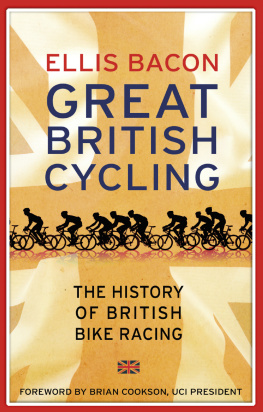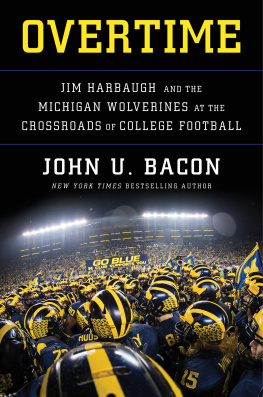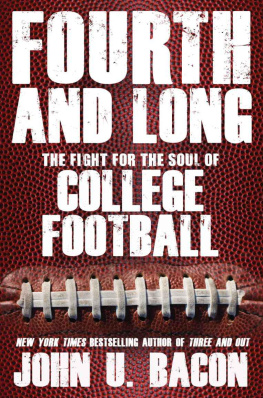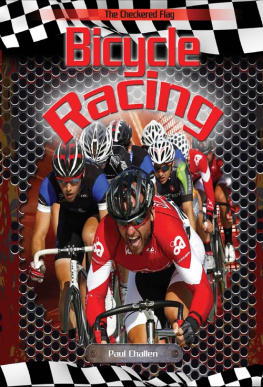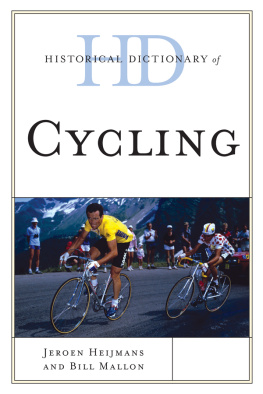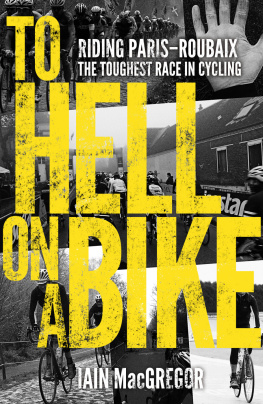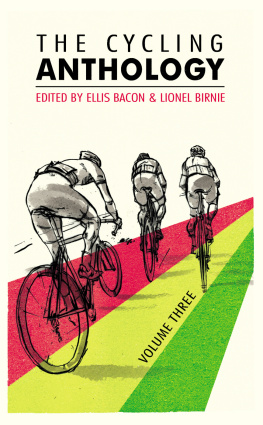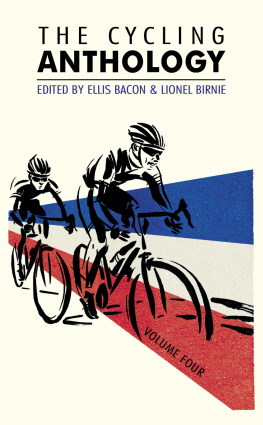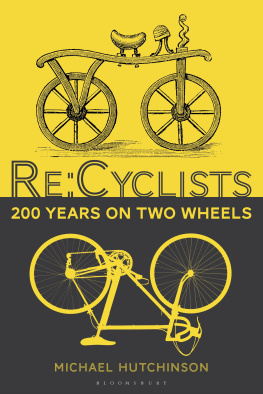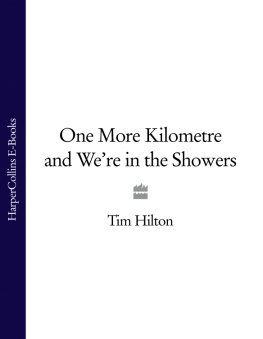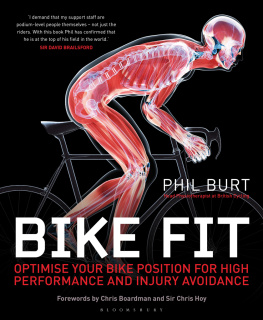CONTENTS
GREAT BRITISH CYCLING
The History of British Bike Racing
Ellis Bacon
ABOUT THE BOOK
In 1868, on the gravel of the Parc de Saint-Cloud in Paris, the world witnessed the inaugural contests between new-fangled velocipedes. To the locals chagrin, an Englishman, James Moore, was victorious, and when he went on to beat 118 other competitors in the first ever road race, between the French capital and Rouen, his place in cycling history was assured. It would be a long journey, however, to British triumphs in the Tour de France.
In Great British Cycling, Ellis Bacon charts that century and a half of evolution that has led to the modern boom in bike riding and racing. As cycling clubs continued to spread across the country, there were nevertheless constant battles to get the sport authorized and accepted, while a lack of finance and equipment often hindered British cyclists attempts to be the best. Yet in every generation, men and women from these shores have found ways to ride their hearts out, and we have lined the roads in our millions to cheer them on.
This is the fascinating and entertaining story of one of our nations favourite sports, told through a winning blend of reportage and personal anecdotes, with the glorious successes and sometimes tragic failures of the sports icons Tommy Simpson, Beryl Burton, Bradley Wiggins weaved in with first-hand tales from some of the lesser-known names that equally deserve their place in the great pantheon of British cycling history.
TRANSWORLD PUBLISHERS
6163 Uxbridge Road, London W5 5SA
A Random House Group Company
www.transworldbooks.co.uk
GREAT BRITISH CYCLING
A BANTAM PRESS BOOK: 9780593073100
Version 1.0 Epub ISBN: 9781448171125
First publication in Great Britain
Bantam Press edition published 2014
Copyright Ellis Bacon 2014
Ellis Bacon has asserted his right under the Copyright, Designs and Patents Act 1988 to be identified as the author of this work.
This ebook is copyright material and must not be copied, reproduced, transferred, distributed, leased, licensed or publicly performed or used in any way except as specifically permitted in writing by the publishers, as allowed under the terms and conditions under which it was purchased or as strictly permitted by applicable copyright law. Any unauthorized distribution or use of this text may be a direct infringement of the authors and publishers rights and those responsible may be liable in law accordingly.
A CIP catalogue record for this book
is available from the British Library.
Addresses for Random House Group Ltd companies outside the UK can be found at:
www.randomhouse.co.uk
The Random House Group Ltd Reg. No. 954009
For my dad, and time-trial pusher-offers everywhere:
Left a bit Right a bit
Three Two One
Thank yooooouuuu
FOREWORD
To say that Im proud to have been president of British Cycling between 1997 and 2013, and to have overseen bike racings unprecedented success and subsequent growth in Great Britain, would be a bit of an understatement.
At the end of 1996, after decades of underachievement in our sport, albeit illuminated by occasional sparks of brilliance, my colleagues and I were elected to bring about a major change in the way things were done. We set about comprehensively restructuring the sport, adopting a bold new strategy and setting new standards of governance and management. In doing so, we were able to invest the influx of money so gratefully received from the National Lottery wisely. But the results both in terms of the sport and in the growth of cycling in general surprised even us and resulted in an astonishing uplift in the sports profile.
Our strategy had three simple elements: to make cycling Britains most popular and successful sport; to boost membership of the federation to 100,000; and to put Great Britain at the top of the UCIs rankings. It is perhaps worth remembering that it was received with disbelief and derision in some quarters! Yet who would argue with that now?
On the sporting side, first Peter Keen, and then Dave Brailsford, with the help of Shane Sutton, Steve Peters and their numerous expert colleagues, brought the best out of what would prove to be an immensely talented crop of young British riders, many of whom had come through our newly established development programmes, and it was at the 2008 Olympic Games in Beijing that that talent overflowed, impossible to ignore any longer by the British press and public.
Looking back to when I first joined a cycling club in 1965, we had already had a number of top riders flying the flag for Britain world champions such as Beryl Burton and Tom Simpson, Tour stage winners like Brian Robinson and Barry Hoban and I can remember following their exploits in magazines like Cycling and Sporting Cyclist. Meanwhile home-based riders like Les West and Hugh Porter put up world-class performances whenever the opportunity arose.
Then, later, we had riders like Robert Millar, Mandy Jones and Sean Yates, and successful pursuiters and team-pursuiters, too. All of these ploughed something of a lonely furrow in their racing careers, certainly without anywhere close to the kind of support that they deserved and that todays top British riders enjoy. A different era, a different approach, though of course we should not forget that many people worked hard behind the scenes with the resources available at the time.
Now, as well as the elite-level successes, there are two other things of which I am proud. Firstly, the grass-roots activities that show people of all ages and ability the joys of our sport and pastime. And secondly, those development and coaching programmes that are ensuring an ongoing stream of talented young men and women, and providing a sustainable level of success over half the GB Olympic cycling team at London 2012 came directly from those programmes.
So, from right back in 1868, when British cyclist James Moore first put his country on the bike-racing map, British cycling has enjoyed more than its fair share of ups and downs, and Im immensely proud to have played a role in one of those ups and to have been part of the amazing journey so wonderfully told in these pages.
In the modern era, Dave Brailsford, as Performance Director, became the media face of British bike racings success, but Im sure he wont mind me saying that none of it would have been possible without the help of so many others, whose efforts truly were invaluable.
Alongside me at British Cycling, I always enjoyed the support of an excellent board and expert commissions, and a highly professional management team, led first of all by chief executive Peter King, and then his successor, Ian Drake, both of whom played vital roles in steering the ship firstly into a safe harbour and then onwards to exciting voyages of discovery.
And thats without having mentioned people such as Chris Boardman, Doug Dailey, John Mills, Jonny Clay and Rod Ellingworth, and the hundreds of others who worked so hard to develop the sport and to push British riders to the top of the medal tables. In fact, there are so many people behind the scenes who deserve huge recognition but who humbly and uncomplainingly worked, and continue to work, so hard for the good of cycling in Great Britain that Id run out of pages were I to name them all.
Despite leaving my post with British Cycling to become president of the International Cycling Union (UCI) in 2013, and although my office is now at the UCI headquarters in Switzerland, Im proud to maintain an active interest in both British cycling and British Cycling that is, the sports growth in the UK, and the federation that continues to nurture burgeoning cycling talent.
Next page
